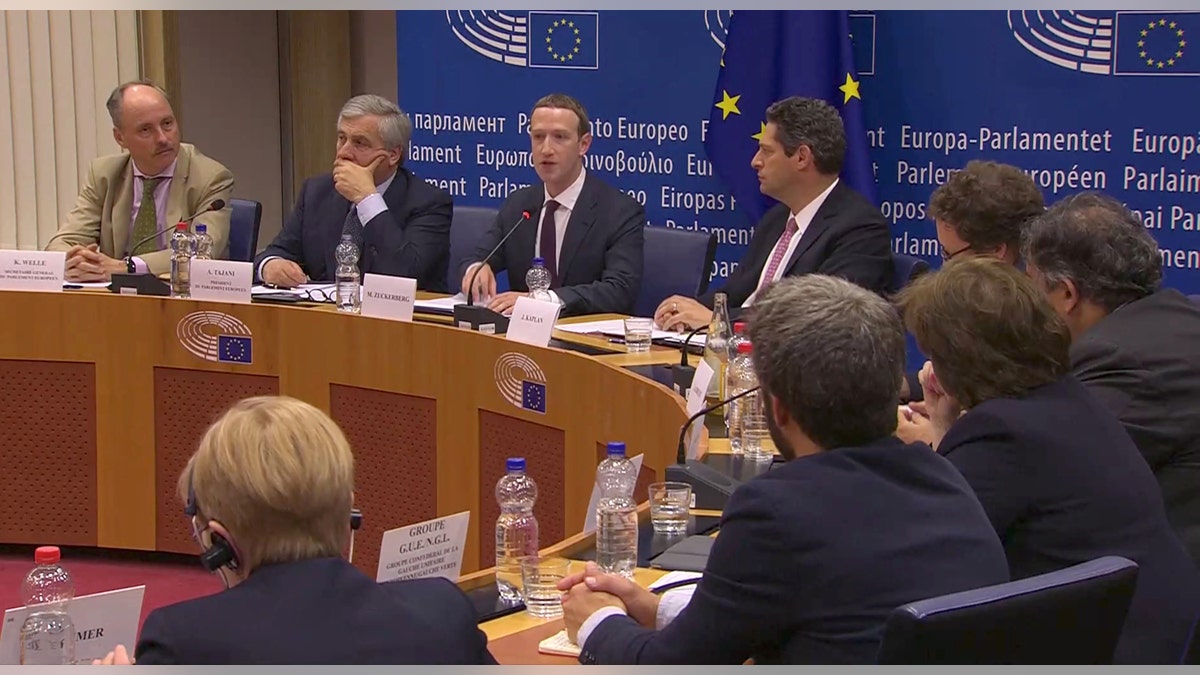
Facebook's CEO Mark Zuckerberg answers questions about the improper use of millions of users' data by a political consultancy, at the European Parliament in Brussels, Belgium, in this still image taken from Reuters TV May 22, 2018. REUTERS/ReutersTV - RC1932751710 (YVES HERMAN)
Facebook chief Mark Zuckerberg appeared before the European Parliament on Tuesday, where he reiterated many of the points he has made in the wake of the Cambridge Analytica scandal.
The meeting's format and time constraints meant the Facebook CEO had only about 30 minutes to answer questions that took at least that long for members to ask, irking some of those in attendance as the briefing drew to a close. Zuckerberg did, however, address several topics, including whether Facebook has a monopoly in the social-networking space, whether it discriminates against politically conservative content, and why it collects data on non-Facebook users.
When asked to name Facebook's top competitor, Zuckerberg failed to mention specific companies—just as he did when Sen. Lindsey Graham posed the same question during last month's US Senate hearings. Instead, he spoke more generally about how Facebook exists "in a very competitive space where people use a lot of different tools" to communicate, repeating his talking point about how the average person uses eight apps or services to talk to friends and family.
"From where I sit, it feels like there are new competitors that come up every day, and we're constantly needing to evolve our service."
More From PCmag
He also argued that Facebook is just 6 percent of the global advertising market, so "clearly advertisers have a lot of choice." Zuckerberg acknowledged that regulators are likely more interested in the consumer choice aspect, though he pointed out that Facebook allows for small businesses to promote themselves in "sophisticated ways...that previously only large businesses had the means to do."
Whether this sways European regulators, at least one of whom brought up the idea that Facebook might need to be broken up into smaller pieces, remains to be seen. The region is a much more privacy-conscious environment than the US, as evidenced by the upcoming General Data Protection Regulation (GDPR), and at today's meeting, Zuckerberg was also pressed on Facebook's tracking of non-users, often referred to as "shadow profiles."
Zuckerberg clearly didn't want to discuss the topic. The format was such that members asked all their questions up front before having them answered by the Facebook CEO. He avoided discussing shadow profiles until the UK's Syed Kamall shouted out the phrase as Zuckerberg was trying to wrap up.
Zuckerberg deflected and discussed Facebook's upcoming "Clear History" feature, but that's for people who have a Facebook account.
When asked again why Facebook collects data on non-users and whether there was a way for them to erase the data Facebook had scooped up, Zuckerberg said collection of data on non-users was important to keep tabs on people who scrape public Facebook data—like names and photos—for nefarious purposes. From the "security side," Facebook thinks it's "important to keep" that data, Zuckerberg concluded before trying to change the subject.
He did, however, address whether Facebook discriminates against conservative viewpoints. The social network found itself in hot water in 2016 when it was accused of omitting right-leaning publications from its Trending Stories feed; ultimately, it replaced human editors with algorithms, with mixed results.
Today, the UK's Nigel Farage—who made frequent appearances in support of Donald Trump during the 2016 election—complained that traffic to his personal page, as well as conservative sites and the US president, has seen a "substantial drop."
Zuckerberg linked any drop in engagement to the company's recent decision to prioritize content from family and friends over that of Pages. "It's very important to me that we're a service that allows for a wide varitety of political discourse," he said.
This article originally appeared on PCMag.com.








































